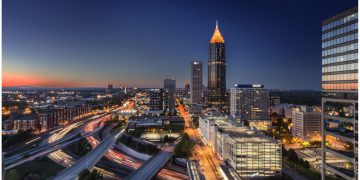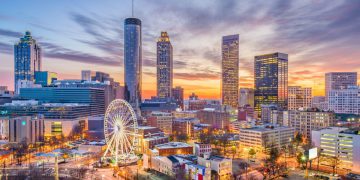
Atlanta has been labeled the capital of the New South. The cosmopolitan hub offers world-class restaurants, a plethora of art and culture, and all the benefits that one would expect from living in a big city. There’s a host of reasons to call ‘Hotlanta’ home, but not every aspect about life in the Georgia capital is positive. If you’re stewing over making a move there, read on for the pros and cons of living in Atlanta before you pack your bags and toss any belongings into storage.
Pros of Living in Atlanta
Booming economy
If you’re looking for a city with a stable job market, Atlanta is a viable choice. Except for the recession years that began in 2007, the city has maintained its spot as one of the country’s most thriving economies. With 16 Fortune 500 companies including Home Depot, Delta Airlines, and UPS, Atlanta features a plethora of opportunity in various industries.
The Atlanta region’s employment has fully recovered from the pandemic. Total employment is up by 14,800 compared to right before the pandemic hit, about half a percent. While the economy trails top markets like Austin and Dallas, Atlanta is still one of the strongest in the country when measured by employment.
Charming in-town neighborhoods

Virginia-Highland, Inman Park, Grant Park, and Decatur among others are some of the best neighborhoods in Atlanta to live because of shopping and dining options as well as beautiful historic districts. These areas also happen to be somewhat walkable, a real bonus in a city plagued by horrific traffic.
Milder winters than other areas of the US
Atlanta doesn’t miss the cold entirely, but winters are shorter, and overall, milder than the Northeast and Midwest. It’s likely that daytime temperatures will heat up to the 50s and 60s, while overnights can dip into the 20s and 30s. Even when temps go below freezing, you can count on a warming trend shortly.
The reasonable cost of living
Homebuyers get a lot of bang for their buck since the cost of living in Atlanta is pretty reasonable, and renters can count on paying less than many other major cities. Average rent for a two-bedroom home is around $2,100 and homes typically sell at around $400K. Taxes are lower than some other big cities too, but owning a car is a given because public transit remains limited, so you will have to factor that expense into your monthly budget.
The BeltLine
This massive project aims to connect 45 in-town neighborhoods by a 22-mile streetcar loop that includes 33 miles of trails and 2,000 public parks. The Beltline serves as a place to walk, run, and bike and provides regional transportation for the community as well as public art projects. The development of The Atlanta BeltLine is ongoing and scheduled to complete in 2030.
Tons to see and do

Atlanta has always had a robust dining scene, and the city’s restaurants continue to impress (check out 6 of the best restaurants in Atlanta). Music, sports (home of the Atlanta Braves, Hawks and Falcons), craft beer, nightclubs, comedy, museums, art galleries – you’ll find a little bit of everything, so you’ll never run short on things to do in Atlanta.
Cons of Living in Atlanta
Not entirely walkable
Atlanta is a driving city and offers limited public transit, so owning a car is a must. Certain in-town neighborhoods such as Virginia Highlands and Decatur are within a walk of some of the city’s best shops and restaurants, but locals still need a car to leave their neighborhoods. If a pedestrian-friendly city is high on your wish list, then Atlanta isn’t the right city for you.
Minimal public transportation

Riding MARTA is “SMARTA” but it doesn’t reach much of Metro Atlanta. The commute can also take almost as long as driving since stations are spread out (you’ll have to walk or drive to the train station and park before riding the train to your destination). Hence, why most Atlantans opt to drive everywhere and don’t ride MARTA.
Urban sprawl
This land-locked city stretches nearly 50 miles in all directions. The metropolitan area encompasses more than 8,000 square miles, a land area similar to the state of Massachusetts. With now 14 counties and 50 municipalities, Metro Atlanta will continue to grow, which means that traffic (up next) can only worsen.
Traffic

Driving in Atlanta is not for the faint of heart. Bearing in mind the number of vehicles on the road each day, it’s no surprise that traffic in Atlanta is some of the worst in the nation. Morning rush hour begins as early as 4 a.m. and runs about six hours. Evening rush starts around 3:30 and can easily last until 8 p.m. The downtown connector can bottleneck at any hour of the day, which means you could be in for traffic as late as 10 or 11 p.m. after a night out on the town.
Brutally hot summers
July and August are brutal months in Atlanta when temperatures can reach the 90s or 100s, and humidity can hang above 70%. In the summertime, Atlantans live in air conditioning and limit outdoor activities. Keep in mind, climate controlled storage might be a good option for any belongings sensitive to the heat. If you prefer hot, humid days and sultry summer nights, then the Dogwood City should be high on your list of places to consider living.
It doesn’t snow often, but when it does…
Because Atlanta isn’t prepared for winter weather, the city shuts down when the white stuff (or worse, ice) starts falling, making for dangerous driving conditions. While it doesn’t snow very often, when it does, snuggle up at home and stay off the roads.
Learn more about Atlanta, GA
9 Ways to Meet New People in Atlanta
The 8 Best Districts for Shopping in Atlanta, GA
[search-nearby searchtext=”Find a Facility” display-type=”inline”]







